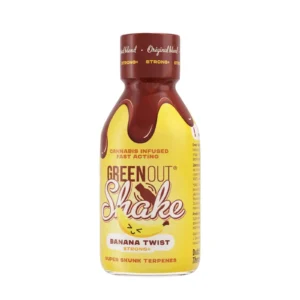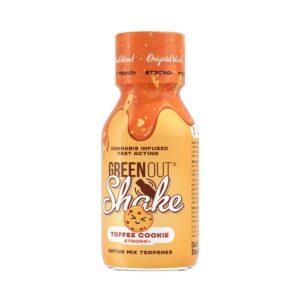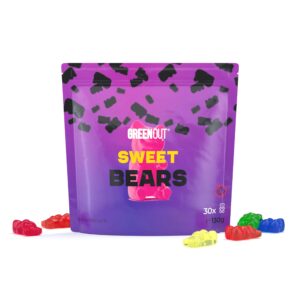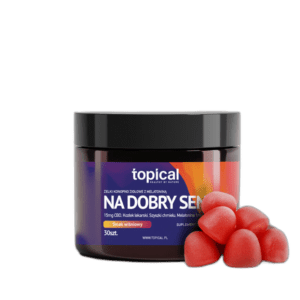In 2025, CBD (cannabidiol) is becoming one of the hottest trends in the culinary world, appearing in more and more food products - from energy drinks to chocolates to jelly beans. In Europe, including Poland, consumers and manufacturers are enthusiastically discovering the possibilities offered by this non-psychoactive compound derived from hemp. CBD in the diet is gaining popularity for its potential relaxation and anti-stress properties, but new EU regulations are introducing both opportunities and challenges for the market. In this article, we'll take a look at why CBD is so popular in culinary, the legal changes coming in 2025, how to safely incorporate CBD into your diet, and offer two easy recipes for smoothies and chocolate truffles with CBD.
Why is CBD in the diet popular?
CBD is winning the hearts of consumers in 2025, becoming a key ingredient in food products that combine taste with potential wellness benefits. In Europe, including Poland, there is growing interest in CBD in the diet, driven by the "wellness" trend and the search for natural alternatives to traditional supplements. Products such as CBD-infused drinks, chocolates, jellies and protein bars with cannabidiol are gaining popularity among people who want to relieve tension, improve sleep quality or simply try something new. The global CBD market, including the food segment, is growing rapidly - according to market data, it is expected to grow from $9.14 billion in 2024 to 2030 at a CAGR of 15.60%.
In Poland, where CBD is legal with a THC content of less than 0.3%, consumers are increasingly turning to cannabidiol-infused foods, seeing them as a way to relax in their daily lives. Cooking trends are moving toward simple, tasty and functional recipes - from CBD-infused coffee to oatmeal and smoothies that can be easily prepared at home.
New EU regulations in 2025
In Europe, CBD in food is strictly regulated as a "Novel Food," as it was not widely consumed in the EU before 1997. In 2025, the European Food Safety Authority (EFSA) resumed evaluating applications for CBD approval as a Novel Food, a breakthrough after previous halts due to lack of safety data. In mid-2022, EFSA halted 19 applications, pointing to deficiencies in data on CBD's effects on the liver, nervous system and reproductive system. However, the first approvals for CBD supplements began to be granted in 2025, opening the door for new food products.
In Poland, as in other EU countries, CBD products must contain less than 0.3% THC, and manufacturers are required to adhere to strict safety and labeling standards. While the new EU regulations seek to harmonize the market, which can facilitate cross-border trade, they also require companies to conduct detailed safety tests. For consumers, this means greater confidence in the quality of products, but also a potential price increase due to additional production costs.
Culinary trends with CBD
In 2025, CBD is ubiquitous in kitchens around the world, and culinary trends are moving toward simple, tasty and functional recipes. CBD-infused beverages such as coffee, teas and energy drinks are popular, combining the relaxing properties of cannabidiol with daily rituals. In sweets, CBD-infused chocolates and jellies reign supreme, and in the breakfast category, smoothies and oatmeal with CBD oil. In Europe, there is growing interest in "ready-to-eat" products, such as CBD protein bars, which combine health benefits with convenience. In Poland, consumers are experimenting with homemade recipes, adding CBD to fruit smoothies, salad dressings or homemade baked goods.
How do you safely incorporate CBD into your diet?
CBD is fat-soluble, which means it is best absorbed when consumed with fats such as coconut oil, butter or milk. Safe doses according to studies range from 10 to 100 mg per day, but it's a good idea to start with a smaller amount (e.g., 5-10 mg) and watch your body's reaction. Excessive intake (more than 300 mg per day) can cause side effects such as fatigue, dry mouth and drug interactions, so moderation is key.
Tips:
- Choose products with laboratory certifications that confirm the absence of THC and the safety of the composition.
- Avoid cooking at high temperatures (above 160°C), as this can degrade CBD - no-bake recipes are better.
- Consult your doctor if you are taking medications, especially those metabolized by the liver (e.g., for blood pressure).
Recipes with CBD
Here are two simple recipes that will allow you to introduce CBD into your diet in a tasty and safe way:
Smoothie with CBD and berries
Ingredients (1 serving):
- 1 cup of frozen blueberries
- 1 banana
- 1/2 cup coconut milk
- 1 tbsp almond butter
- 5-10 mg of CBD oil (1-2 drops of standard 500 mg oil).
- 1 teaspoon of honey (optional)
Preparation:
- In a blender, blend berries, banana, coconut milk and almond butter to a smooth paste.
- Add CBD oil and honey if you want to add sweetness, and blend for another 5 seconds.
- Pour into a glass and enjoy a relaxing smoothie, perfect for breakfast or after a workout.
Chocolate truffles with CBD
Ingredients (10-12 truffles):
- 100 g dark chocolate (min. 70% cocoa)
- 1/4 cup coconut cream
- 1 teaspoon vanilla extract
- 20 mg of CBD oil (4-5 drops of standard 500 mg oil).
- Cocoa powder to coat
Preparation:
- Melt the chocolate in a water bath, add the coconut cream and stir until a smooth paste forms.
- Add vanilla extract and CBD oil, mix thoroughly and refrigerate for 1-2 hours until the mixture hardens.
- Form small balls (1 teaspoon of mixture per truffle), coat them in cocoa and store in the refrigerator.
- Consume 1-2 truffles a day to enjoy the subtle relaxing effect and taste of chocolate.
Impact of regulation on the market
The new EU regulations in 2025 have a twofold effect. On the one hand, the harmonization of regulations makes it easier for manufacturers to bring products to the European market, which increases the availability of CBD in Poland. The first EFSA approvals for CBD supplements open the door for new food products, such as beverages and snacks. On the other hand, stringent safety requirements raise production costs, which could translate into higher prices for consumers. In Poland, the market for CBD in food is still in its nascent stage, but growing public acceptance and interest in functional products point to a promising future. As regulations become clearer, we can expect to see more innovative culinary products with CBD on the shelves.
CBD in the diet is one of the most exciting culinary trends of 2025, combining taste with potential relaxation benefits. New EU regulations bring greater transparency, but also challenges for producers that could affect prices and availability. With simple recipes like berry smoothies and chocolate truffles, you can safely experiment with CBD in your kitchen, enjoying both the taste and subtle effects of cannabidiol. The key, however, is to choose quality products and follow dosage recommendations to fully enjoy what CBD has to offer.








